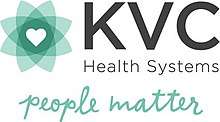KVC Health Systems
 | |
| Founded | 1970 |
|---|---|
| Founders | Ellen McCarthy, JoAnn & Fred Ball and family, Junior League of Wyandotte and Johnson Counties |
| Location |
|
| Origins | Kansas City, Kansas (USA) |
Area served | USA |
Key people | Jason Hooper, CEO; B. Wayne Sims, Past CEO |
| Website |
www |
Formerly called | Kaw Valley Center, Wyandotte House |
KVC Health Systems, Inc. (KVC) is a private, nonprofit child welfare and behavioral healthcare organization. When Kansas became the first U.S. state to privatize its child welfare services in 1996, it selected KVC to be one of the service providers. As of 2018, KVC Kansas remains the only original contractor that is still providing these services. KVC has provided foster care case management services longer than any other private organization in the U.S.
Since its founding in 1970, KVC has grown since from a single home for at-risk boys in Kansas to a national organization serving 60,000 children and families in the United States. KVC uses evidence-based research to achieve better outcomes and advance child welfare.
History
What is now KVC Health Systems started in 1970 as Wyandotte House in Wyandotte County, Kansas. B. Wayne Sims was hired in 1980 as President and CEO. He contributed some of the organization's guiding philosophies including, “What would you want for your child?” and “There is no magic answer down the street." He retired at the end of 2015, completing 35 years as KVC's President and CEO. The current CEO is Jason Hooper.
When the state of Kansas became the first state to privatize child welfare services in 1996, KVC was selected as one of the contractors. In 2018, KVC remains the only original contractor in the state. On July 1, 2013, the Kansas Department of Children and Families awarded KVC an expanded contract, making KVC responsible for children needing foster care in 30 counties of eastern Kansas.[1] These services are provided through subsidiary KVC Kansas, also known as KVC Behavioral HealthCare. An August 2013 visit to Kansas by a delegation from Singapore's government attests to KVC's success in improving outcomes for vulnerable children. [2][3]
Overview
KVC provides services for children and families including foster care, adoption, in-home family therapy / family preservation services, behavioral healthcare, outpatient services and residential psychiatric hospital care for children and adolescents.
The organization has been accredited by The Joint Commission since 1991.[4]
KVC Health Systems is the parent organization of subsidiaries including:
- KVC Kansas (also known as KVC Behavioral HealthCare)
- KVC Hospitals
- KVC Nebraska (also known as KVC Behavioral HealthCare Nebraska)
- KVC West Virginia (also known as KVC Behavioral HealthCare West Virginia)
- KVC Kentucky (also known as KVC Behavioral HealthCare Kentucky)
- Niles (also known as Niles Home for Children)
State and federal agencies as well as international governments often call on KVC Health Systems to provide consulting on how to improve child welfare.
In 2017, KVC Health Systems took possession of the former campus of the West Virginia Institute of Technology in Montgomery, WV. KVC is working to create the nation's first ever college to help youth who age out of foster care transition to a successful adulthood. KVC's campus is called the Riverbend Center Supporting Higher Education.
Partnerships
Dr. Glenn Saxe, director of The Child Study Center at New York University's Langone Medical Center, has worked with KVC to adapt his Trauma Systems Therapy (TST) approach to the foster care community. This aims to equip foster parents to better support children who have experienced trauma such as abuse or neglect.
KVC Health Systems partnered with the Annie E. Casey Foundation, Child Trends, and the Child Study Center at New York University to conduct a five-year study of integrating trauma-informed care into the child welfare system. The study found that the implementation of TST throughout the entire agency was successful and created positive results for children. Children exposed to TST showed measurable improvements in functioning, behavior regulation and placement stability (which means not moving from foster family to foster family). Within the first three months of exposure to trauma-informed care, children also showed improvements in emotional regulation. Finally, staff reported higher levels of effectiveness with children based on concerted care using an integrated, multi-disciplinary approach grounded in a common language and shared interventions.
Notes
- ↑ "Foster care contracts to change hands Monday | Kansas Health Institute". Khi.org. 2013-06-28. Retrieved 2013-12-06.
- ↑ Marso, Andy. "Administration touts Singapore delegation's reaction to privatization". CJOnline.com. Retrieved 2013-12-06.
- ↑ "Singapore Delegates Impressed by Kansas Child Welfare - Newsroom". Dcf.ks.gov. Retrieved 2013-12-06.
- ↑ "The KVC Difference | KVC Health Systems". Kvc.org. Retrieved 2013-12-06.
External links
- KVC Health Systems website
- Facebook page for KVC Health Systems
- LinkedIn page for KVC Health Systems
- Twitter page for KVC Health Systems
- Guidestar profile for KVC Health Systems
- CareerBuilder page for KVC Health Systems
- NYU Langone Medical Center - KVC's Use of Trauma Systems Therapy
- Video of KVC President/CEO Wayne Sims on the history of KVC
- Kansas City Royals' James Shields and KU Coach Bill Self Help KVC Kids in Foster Care
- Kansas City Royals' Big Game James Section for KVC Kids in Foster Care